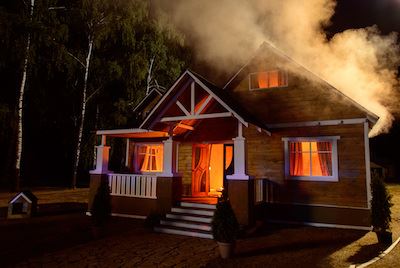Did you know many common household items can increase your risk of fire? Just knowing what to watch for and fixing a few things can create a safer living environment.
Extension Cords
How old is your home? Older homes weren’t built for our modern lifestyle. Older homes often only have one outlet on a wall. And if you have a lot to plug in – digital devices, home entertainment, lights, computer equipment, appliances – the easiest solution is to plug in an extension cord. Overloaded extension cords are more likely to melt wire insulation and cause a fire. Some extension cords don’t meet safety standards and put you more at risk. They can also increase the risk of hidden electrical shorts. Using your electrical outlets in the wrong way can ignite nearby combustible material and set your house on fire.
Gas Water Heater
Gas water heaters are often located in the basement or crawlspace. They are often the best place for storing boxes and extra household goods. Over time, those items can move too close to the water heater and ignite as the water heater turns on.
Gas Stove
You might love your gas stove, but if you don’t clean it the right way, it can be a fire risk. Every time a pot boils over or you spill ingredients on the stove, grease and other flammable materials can build up on the burners. Cleaning them the right way can prevent a clog, which can flame up when using while cooking.
Loose Outlets
Every time you plug in or remove a plug from an outlet, it has the potential to loosen the wires to the outlet. This can create dangerous arcing. Be sure to inspect your outlets on a regular basis.
Antiques
Depending on your decor, it can be fun to bring in antique appliances. Your grandmother’s light might look fabulous in the bedroom. Those old stoves can give your kitchen a country flair. But how safe are they? Before you connect anything, it’s imperative that you know how old the wiring is. If it’s created in the US or EU, look for a UL label attached to ensure its safety.
Dryer Lint
You might clean the lint out of your dryer lint trap regularly, but when was the last time you cleaned the vent pipe? Dryers cause thousands of fires every year as lint builds up and catches fire from gas burners or heating elements catching on fire.
Barbecues
We love our grills, especially now in the spring as the weather warms. But if they aren’t kept in a safe place, they can put your house at risk of fire. Make sure they aren’t directly underneath any part of your house to avoid toxic fumes from seeping in. Be sure to keep the grease trap clean between uses. Better yet, create an outside living space and have one professional installed – gas barbecues are not only more convenient, but they’re also safer too.
Are you doing all you can to keep your home safe from fires?

